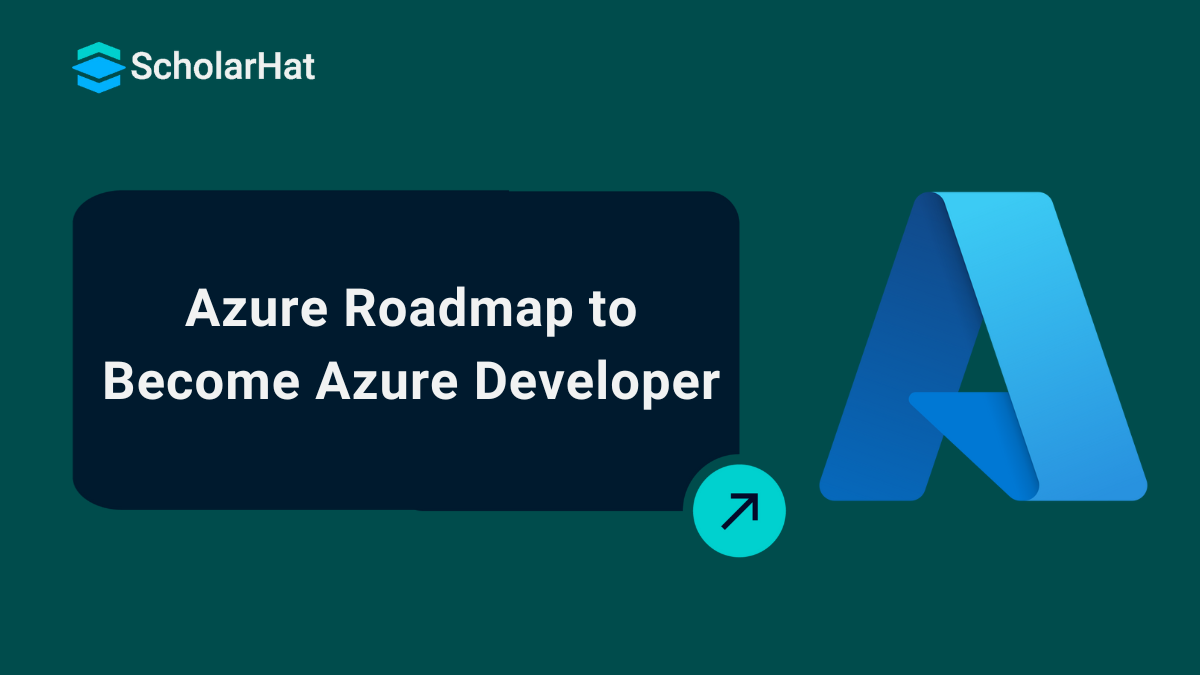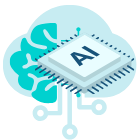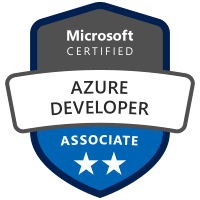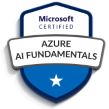13
FebAzure Roadmap to Become Azure Developer
Overview of Azure Developer Roadmap
Cloud computing has emerged as a key component of modern software development in today's quickly changing technological landscape. Among the main cloud service providers, Microsoft Azure stands out as a comprehensive platform that provides a wide range of services for developing, deploying, and administering cloud applications. An Azure Developer's job involves applying these services to build scalable, dependable, and secure solutions that fulfill the demands of businesses and organizations.
Azure skills are projected to boost your earning potential by 20% in the next 3 years. Enroll now in our Azure Fundamental Free Course with Certification!
Introduction of Azure Developer
An Azure developer is a software specialist who creates cloud-based applications utilizing Microsoft Azure, a public cloud platform that provides a variety of services such as storage, networking, databases, and artificial intelligence. They are skilled in coding, security, testing, and deployment, working across all stages of application development to produce scalable and efficient solutions on the Azure platform.
Why Learn Azure Developer Associate?
Learning Azure Developer Associate certification provides you with in-demand skills for designing, building, testing, and maintaining cloud applications in Microsoft Azure. This certification verifies your experience in cloud development, broadening your career prospects and allowing you to effectively participate to current software development projects across sectors.
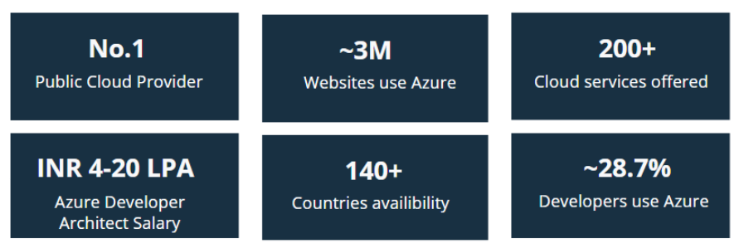
Who should pursue this roadmap?
The Azure Developer roadmap has been designed for a variety of developers, including:
- Software developers: Software engineers with experience building apps in various domains can benefit from learning Azure programming to improve their abilities and remain competitive in the employment market.
- Full Stack Developers: Full-stack developers, adept in both front-end and back-end development, can broaden their skills to include cloud-based solutions by learning Azure development.
- Front-end developers: Front-end developers specializing in user interface design and client-side scripting can broaden their skills by incorporating Azure services into their apps, improving functionality and performance.
- Back-End Developers: Back-end developers in charge of developing server-side logic for apps can use Azure services to build scalable and robust back-end systems that power modern applications.
Career Benefits of Becoming an Azure Developer
Proficiency in Azure development provides various career benefits, including:
- High demand: As cloud technologies become more widely adopted, there is an increasing demand for Azure developers.
- Competitive salaries: Azure developers are compensated well for their specialized skill set and the value they deliver to organizations.
- Career advancement: Mastery of Azure development opens the door to positions such as cloud architects, solutions architects, and technical leads.
- Global opportunities: Azure talents are in high demand around the world, providing developers with the opportunity to work on projects for a variety of clients and sectors.
| 👉 Master Azure with our comprehensive roadmap! - Download PDF |
Essential Skills for Azure Developers
1. Programming languages
Knowing numerous programming languages, like as C#, Java, and Python, is required for Azure development. Each language has its advantages; C# is especially well-suited for developing Azure applications with the.NET framework, Java offers cross-platform compatibility, and Python excels at data processing and AI integrations.
2. Cloud development concepts
Understanding microservice architecture enables developers to create modular, scalable apps on Azure. Continuous Integration/Continuous Deployment (CI/CD) pipelines streamline software delivery while increasing agility and reliability. Embracing DevOps methods promotes collaboration between development and operations teams, resulting in faster deployments and better alignment with business objectives.
3. Azure SDKs and APIs
Understanding Azure's Software Development Kits (SDKs) and Application Programming Interfaces (APIs) allows developers to properly use Azure services. These tools enable programmatic access to Azure resources, allowing for easy integration and automation within applications.
4. Data storage options
Azure provides a variety of data storage solutions, including Blob Storage for unstructured data, Azure SQL Database for relational data, and Azure Cosmos DB for worldwide distributed databases. Understanding the benefits and limits of each storage solution allows developers to select the best option depending on data requirements and scalability.
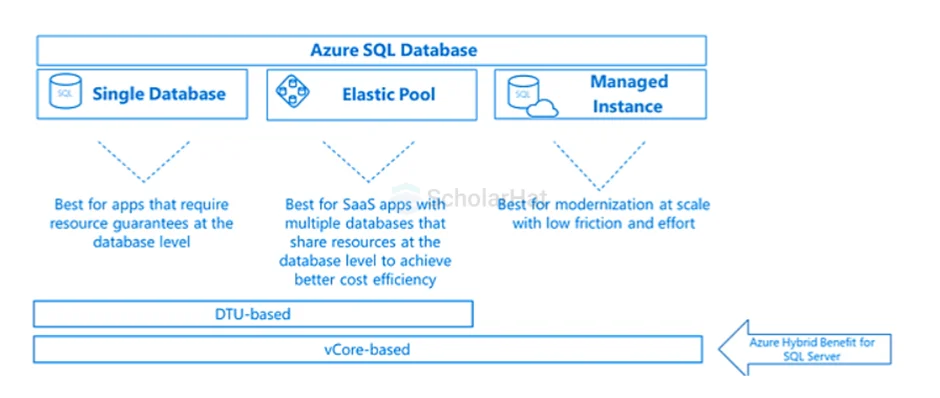
5. Authentication and authorization techniques
Using strong authentication mechanisms such as Azure Active Directory (AAD) guarantees secure access to Azure resources. RBAC provides fine-grained control over user permissions, protecting critical data and applications from unauthorized access.
6. Security best practices
Following security best practices, including encryption, network security, and threat detection, is critical for protecting Azure apps and data. Regular security assessments, compliance audits, and adherence to industry standards provide strong protection against cyber threats and data breaches.
7. Debugging & troubleshooting skills
Understanding debugging tools and techniques allows developers to quickly detect and address issues in Azure apps. Azure Monitor for logging and performance monitoring, combined with advanced debugging tools such as Application Insights, enables proactive troubleshooting and application performance optimization.
8. Version control systems (Git)
Using Git for version control facilitates collaborative development and code management in Azure projects. Understanding Git workflows, branching methods, and pull requests promotes successful collaboration among development teams, maintaining code integrity and traceability throughout the development process.
9. Continuous development and adaptation
Azure developers must embrace a culture of continuous learning to stay current with emerging technology and best practices. Participating in training programs, conferences, and online forums promotes professional development and allows developers to adapt to changing market trends and expectations.
Deep Dive into Azure Services for Developers
1. Azure App Service
- Fully managed platform for web apps and APIs.
- Supports multiple languages.
- Offers automatic scaling and high availability.
- Simplifies deployment and management of web applications.
- Provides built-in integration with Azure services.
- Supports continuous deployment and DevOps practices.
- Enables seamless integration with Azure DevOps for CI/CD pipelines.
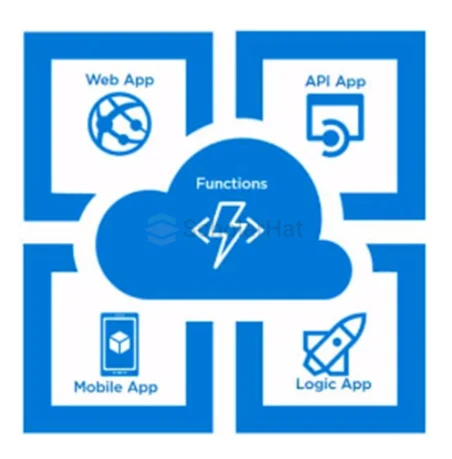
2. Azure Functions
- Facilitates serverless computing for event-triggered code.
- Supports various triggers for microservices and event-driven systems.
- Enables rapid development and deployment of small, focused functions.
- Scales are automatically based on demand.
- Integrates seamlessly with other Azure services like Azure Storage and Azure Event Grid.
- Supports multiple programming languages including C#, JavaScript, Python, and Java.
- Enables cost-efficient solutions by paying only for resources consumed.
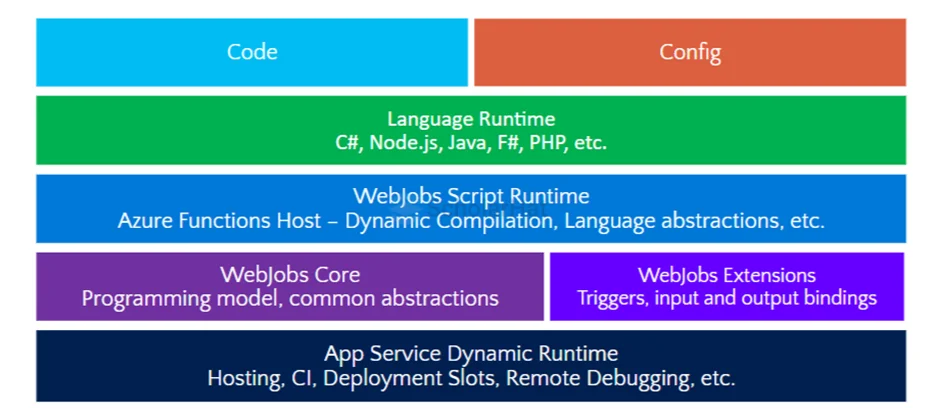
3. Azure Container Instances
- Allows quick deployment of containerized applications.
- Eliminates the need for managing virtual machines.
- Ideal for rapid growth and short-lived tasks.
- Supports various container orchestrators.
- Offers fast startup times and granular billing.
- Integrates with Azure Monitor for monitoring and logging.
- Provides isolation for individual containers.
4. Azure Cosmos DB
- Globally distributed, multi-model database service.
- Designed for highly responsive and scalable applications.
- Guarantees low-latency data access worldwide.
- Supports multiple data models including document, key-value, graph, and column-family.
- Provides comprehensive SLAs for performance metrics.
- Offers automatic and manual scaling options.
- Enables seamless integration with popular frameworks and tools.
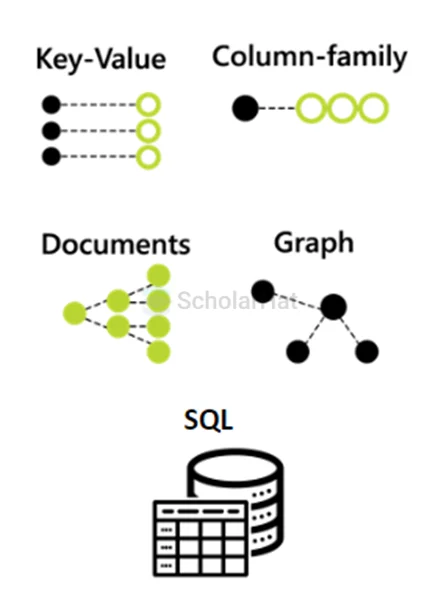
5. Azure Kubernetes Service (AKS)
- Simplifies deployment, management, and scaling of containerized applications with Kubernetes.
- Automates operational tasks such as health monitoring and scaling.
- Provides enterprise-grade security and compliance features.
- Enables efficient resource utilization through node autoscaling.
- Offers integration with Azure Active Directory for authentication and authorization.
- Facilitates rolling updates and blue-green deployments.
- Supports hybrid and multi-cloud deployments.
6. Azure API Management
- Comprehensive solution for constructing, publishing, securing, and analyzing APIs.
- Facilitates seamless connection with internal and external systems.
- Provides capabilities for API versioning and access control.
- Offers developer portal for API documentation and self-service registration.
- Enables API monetization and usage analytics.
- Supports rate limiting and throttling to manage API usage.
- Integrates with Azure Active Directory for authentication and authorization.
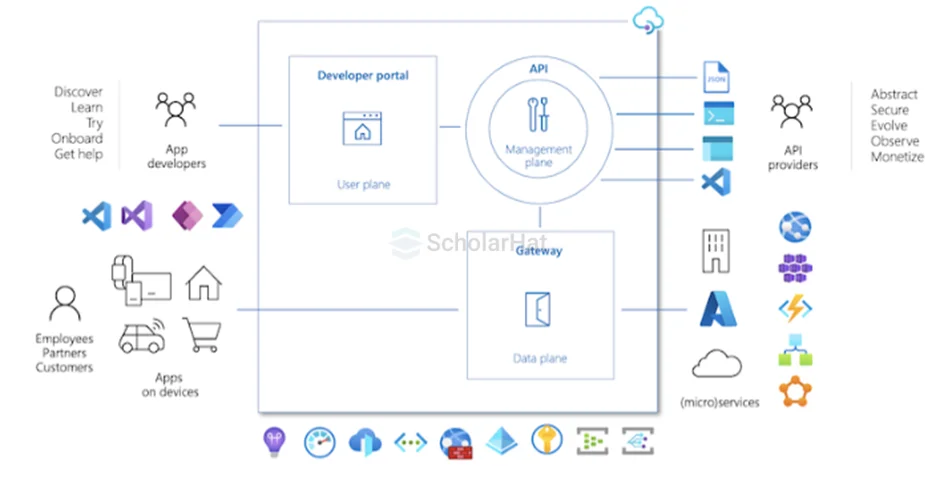
7. Azure Virtual Machines
- Provides scalable computing resources with various OS options.
- Offers flexibility and control over infrastructure.
- Supports Windows and Linux virtual machines.
- Enables rapid provisioning and deployment.
- Integrates with Azure Backup for data protection.
- Supports high-performance computing scenarios.
- Offers a wide range of VM sizes to meet diverse workload requirements.
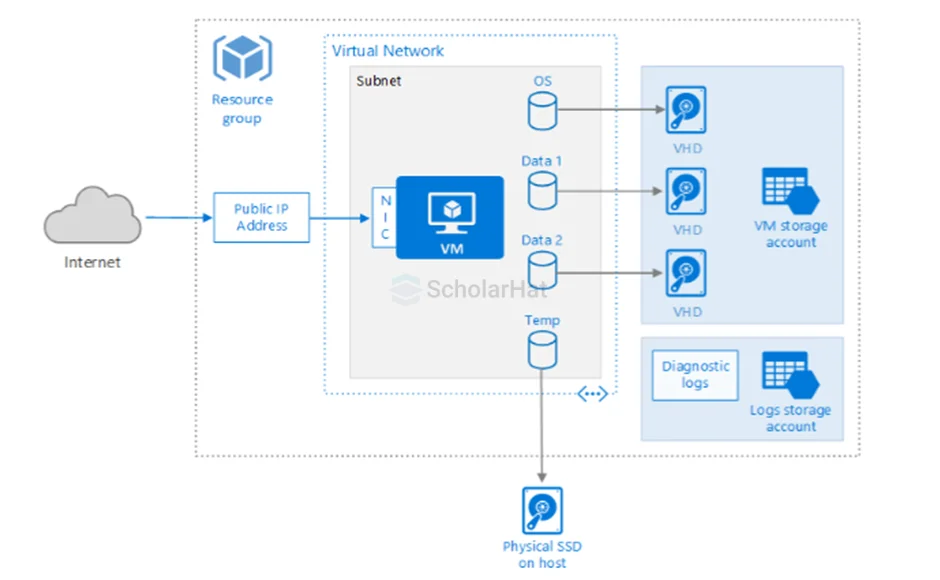
8. Azure DevOps
- Provides collaborative tools and services for software development and delivery.
- Includes version control, build automation, release management, and testing tools.
- Facilitates agile project management and planning.
- Supports continuous integration and continuous deployment (CI/CD) pipelines.
- Enables collaboration among development, operations, and quality assurance teams.
- Offers integration with popular development tools like Visual Studio and GitHub.
- Provides insights into project health and performance through reporting and analytics.
9. Azure Monitoring
- Delivers extensive information about the performance and health of Azure resources and applications.
- Facilitates quick issue detection and resolution.
- Offers real-time monitoring and alerting capabilities.
- Provides built-in integration with Azure services for seamless monitoring.
- Supports custom metrics and logs for deeper insights.
- Enables visualization of data through dashboards and reports.
- Integrates with Azure Security Center for threat detection and response.
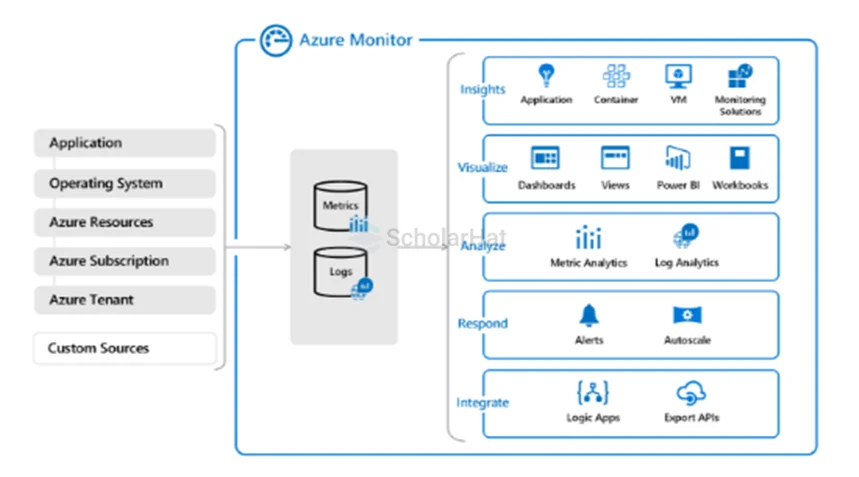
10. Azure Storage
- Provides scalable and secure cloud storage options for various data types.
- Enables efficient data handling and management.
- Offers blob storage for unstructured data, file storage for file shares, and table storage for structured data.
- Supports data redundancy and disaster recovery through replication options.
- Integrates with Azure Active Directory for access control and authentication.
- Provides encryption at rest and in transit for data security.
- Offers tiered storage options to optimize costs based on access frequency.
11. Azure Key Vault
- Secure storage solution for sensitive data such as keys, secrets, and certificates.
- Centralized management of cryptographic keys and secrets.
- Offers access control and permission management.
- Facilitates compliance with regulatory requirements.
- Integrates with Azure services for secure access to keys and secrets.
- Provides audit trails and logging for compliance and troubleshooting.
- Enables key rotation and versioning for enhanced security.
Azure Developer Certification Path
For developers wishing to prove their Azure expertise, Microsoft provides a Azure certification path that includes:

- Microsoft Certified: Azure Fundamentals (AZ-900): Microsoft Certified: Azure Fundamentals (AZ-900) is an entry-level certification that validates fundamental knowledge of Azure cloud services.
- Microsoft Certified: Azure Developer Associate (AZ-204): This Azure Developer Associate certification demonstrates ability in designing, creating, testing, and maintaining cloud applications and services on Azure.
- Microsoft Certified: Azure Solutions Architect Expert (AZ-303, AZ-304): This certification confirms skills in creating and implementing Azure-based solutions for developers.
- Microsoft Certified: DevOps Engineer Expert (AZ-400): This certification verifies the skills of DevOps engineers in implementing DevOps procedures and practices utilizing Azure technology.
Real-Time Projects
- Real-time stock price monitoring: This project involves building an application that continuously monitors stock prices and sends alerts to users when prices reach certain thresholds. You can use Azure Event Hubs to capture real-time stock data and Azure Functions to process the data and send alerts.
- IoT device monitoring: This project involves building a system that collects data from IoT devices in real time and displays it on a dashboard. You can use Azure IoT Hub to collect data from devices and Azure Stream Analytics to process the data and visualize it on a Power BI dashboard.
- Live chat application: This project involves building a real-time chat application that allows users to chat with each other in real time. You can use Azure SignalR to enable real-time communication between users.
- Social media sentiment analysis: This project involves building a system that analyzes the sentiment of social media posts in real time. You can use Azure Cognitive Services to analyze the sentiment of text and Azure Databricks to process the data in real time.
- Fraud detection: This project involves building a system that detects fraudulent transactions in real time. You can use Azure Machine Learning to build a fraud detection model and Azure Functions to deploy the model and score transactions in real time.
Summary
Finally, the Azure Developer roadmap prepares developers to build and deploy applications on Microsoft Azure, hence increasing career opportunities and organizational success in cloud computing.
Earn up to ₹14 LPA as an Azure-certified developer. Enroll in our Microsoft Azure Developer Certification training now!
| Download this PDF Now - Azure Developer Roadmap By Scholarhat PDF |
Take our Azure skill challenge to evaluate yourself!

In less than 5 minutes, with our skill challenge, you can identify your knowledge gaps and strengths in a given skill.

